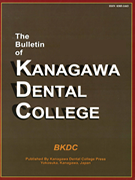- HOME
- > 一般の方
- > バックナンバー:The Bulletin of Kanagawa Dental College
- > 17巻2号
- > アブストラクト
アブストラクト(17巻2号:The Bulletin of Kanagawa Dental College)

English
| Title : | Androgen Action in Submandibular Gland |
|---|---|
| Subtitle : | CLINICAL AND RESEARCH TOPICS Salivary Gland/Saliva |
| Authors : | Shinri Koshika, Mayumi Tarui, Kengi Yamaguchi, Yoshiyuki Nakayama |
| Authors(kana) : | |
| Organization : | Department of Biochemistry, Kanagawa Dental College |
| Journal : | The Bulletin of Kanagawa Dental College |
| Volume : | 17 |
| Number : | 2 |
| Page : | 141-144 |
| Year/Month : | 1989 / 9 |
| Article : | Report |
| Publisher : | Kanagawa Odontological Society |
| Abstract : | Reports from a number of research centers during the past few years have clearly indicated that protein receptor molecules have an essential role in transmitting the effects of steroid hormones within the cells of responsive tissues. Several steps are believed to be necessary before an androgen can exert its effect. The process involves an interaction between the steroid hormone and a specific protein in the cytoplasm. The complex thus formed is transferred to the nucleus, where a close association of the steroid hormone is established with certain chromosomal sites composed of DNA and nuclear acidic protein. The steroid hormone receptor complexes directly modulate the transcription of chromatin by RNA polymerase. Androgen receptors have also been implicated in the regulation of DNA synthesis and cell proliferation in the target cells. These actions are common to all steroid hormones. Many workers reported the sexual dimorphism in the convoluted tubules in the submandibular gland (SMG) of rodents and this organ is influenced by testosterone (T). |
| Practice : | Dentistry |
| Keywords : | Submandibular Gland, Androgen Metabolism, Androgen Receptor |
